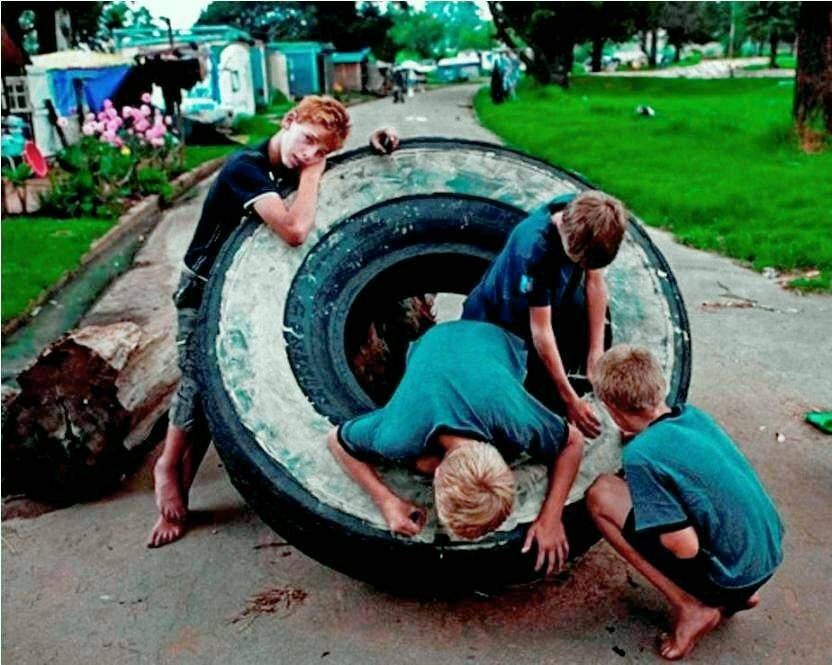
South Africa: Economy

Figure 1.--South Africa was once the economic powerhouse of Africa. Poverty is primarily a problem experienced by South Africa's black majority, although black South Africans are better off than in the rest of sub-Saharan Africa. The high hopes following the end of Apartheid have not been realized, in part because the South African black majority governments since 1994 has provdn to be both incompetent and corrupt. This has weakened the economy and affected the resources available to the government. While poverty is primarily associated with the black majority, rhere are also poor whites. Here we see poor Afrikaner children. They families live in a camp at Krugersdorp, a mining city in the West Rand of Gauteng province.
|
|
Africa was almost enturely divided up by the European powers in the 19th century Scranble for Africa. South Africa was the first Africa country to begin to emerge from European control, although under a white controlled government. After World War II, other African countries began to achieve independence. The high hopes of independence were dashed througout Africa by economic failure. Economic conditions fgor the most part declined throughout Africa the various countries achieved independence. Ironically, racist Apartheid South Africa proved to be the economic powehouse of the continent. It might be said that the economic success was achieved by exploiting black labor. But the fact that blacks in neigboring states vied to enter South Africa to work there demobstrates that more was involved than the exploitation of blacks. The racist South African economy generated European style lives for whites and living standards for blacks above that of most other African countries. The Apartheid re\gime was replaced with black majority rule (1994). There were high hopes both within and outside of the country for a bright multi-racial future. Those bright hopes have not been asvhieved. South Africa today, blacks and colored (mixed race) can now enter the middle class and live in nice neigborhoods, the great bulk of the black population has not benefitted greatly. Unemployment has risen from 17 percent in 1995 to 25 percent in 2009. The infrastructure inherited has deteriorated The state-owned energy compsny, Eskom, now has to implement rolling power outages. The responsibility for the economic decline lies at the feet of the governing African National Congress (ANC). [Johnson] Nelson Mandella was an inspiring figure in ending Apartheid, but his age and abilities were less suited to overseeing an economy. Mandela at a cabinent meeting asked, "Who is a good economist?" Trevor Manuel thought Mandella had asked, "Who is a good communist?" and raised his hand. Manuel did a reasonable job as Finance Minister (1996-2009), but it was blind luck. Most other South African ministers were incompetent or corrupt or both. And his sucessor Thabo Mbeki lacked Mandelas mora sruples without any reedeming managerial capabilities. Mbeki is best known for fighting AIDs with garlic and potatoes. Under the ANC black revolutionary nationalism and rampant coruption, South Africa's once vibrant economy has declined. South Africa's new president, Jacob Zuma, has promised reforms, what will be achieved is an open question.
Sources
Johnson, R.W. South Africa's Brave New World (Overlook: 2010), 702p.
HBC

Navigate the Boys' Historical Clothing South African pages:
[Return to the Main South African page]
[Return to the Main country economy page]
[S.A. children's lierature]
[S.A. choirs]
[S.A. school uniforms]
[S.A. youth groups]
Navigate the Boys' Historical Clothing Web Site:
[Return to the Main countries page]
[Introduction]
[Activities]
[Biographies]
[Chronology]
[Clothing styles]
[Countries]
[Bibliographies]
[Contributions]
[FAQs]
[Glossaries]
[Images]
[Links]
[Registration]
[Tools]
[Boys' Clothing Home]
Created: 12:39 AM 11/25/2010
Last upfates: 12:39 AM 11/25/2010



